Fallen Moon's Requiem is the ninth and real final stage in Bloodstained: Curse of the Moon.
Overview[]
This hellish stage is a Japanese-themed volcanic mystic zone that consists of three different paths where the heroic trio must split up in order to make progress. Whenever a mini-boss is defeated by one party member, the gameplay swiftly moves on to the other due to the ability to switch between party members being disabled. The darkness-influenced Zangetsu, with his sword reinforced as arm blades, is waiting inside the throne room in his deepest lair to challenge the trio. Sadly, only Miriam is playable during the final battle while Alfred and Gebel occasionally provide assistance to help fend off attacks that she couldn't dodge on her own.
Enemies[]
- Yurei
- Nue
- Bonesnatcher
- Nukekubi
- Ghast
- Oni (mini-boss)
- Samurhammer (mini-boss)
- Decarabia (mini-boss)
Boss[]
Items[]
- [[]]
- [[]]
Gallery[]
Trivia[]
- As aforementioned, the level is portrayed as to Japanese Buddhist depictions of the Sanzu River, being roughly the equivalent to the River Styx, and the domain of Enma, the Judge of the Dead, as well as to Naraka, the Hell Realm of Buddhist cosmology. The foremost location is often depicted as a barren and desolate, as well as dangerous and harsh place, a rocky waste without vegetation and whose wide and deep river is fraught with unforgiving rapids, treacherous depths, and ravenous dragons and snakes, helping to highlight and emphasize the futility of reincarnation, the constant bleakness of the material world, and the neverending reoccurence of suffering within existence, while the latter two locations are said to be places of imposing and brutal but fair judgement, with fiery and volcanic backdrops to show their intensity, and employs fearsome demons such as oni to act as its enforcers and tormentors of the damned not unlike Christian depictions of Hell.
- The final room before facing Zangetsu is a visual metaphor for the idiom/koan "If you meet Buddha down your path, cut him down"; within the context of Buddhist philosophy, it is often stressed that one's path in life is of one's own salvation, and it is through their integrity and self motivation that will guide one to the truth rather than divine miracles and deliverance. A more nuanced saying would be, by Miyamoto Musashi, "Respect Buddha and the gods without relying on their help".














































